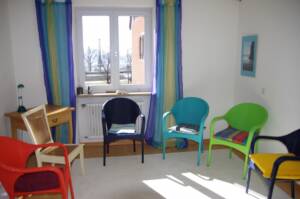The Association of Cancer Patients (APOZ) conducted specialized training for medical professionals, dedicated to the challenges of communicating with patients, facing dire diagnoses. The training was aimed at medical oncologists, surgeons, hematologists, anesthesiologists and other medical experts. The initiative is implemented with the support of Fantastico.
The event "Dialogue with the patient in difficult moments" covered key issues such as communicating bad news and managing conflict situations with patients and their relatives. The aim of the training was to help professionals develop their skills for effective communication, especially in situations of crisis and emotional stress.
"The medical professionals, who encounter cancer patients, daily feel the pressure and the need to deliver hard news. Therefore, it is extremely important that they have the necessary tools to deal with these situations", commented Evgenia Alexandrova, Chairman of APOZ.
The trainers were Dr. Margarita Tarain, clinical psychologist, psychotherapist Orlin Todorov and Alexander Milanov from the Clinical Psychology Center at Tokuda UMBAL. With the help of discussions and case work they trained 38 doctors from different specialties, among them surgeons, oncologists, resuscitators, anesthesiologists and emergency physicians.
Scientific evidence supports the importance of communication in oncology
Doctor-patient communication plays a central role in medical practice. Studies show, that the quality of communication has a direct impact on the outcome of the treatment and the emotional state of the patient. Research published in the Journal of Clinical Oncology reveals, that effective communication improves more than just patient satisfaction, but also his ability to understand the diagnosis and make an informed decision about his therapy. Evgenia Alexandrova emphasized the importance of psychological support and communication in medical practice: "It is often difficult for patients to take in the news, which the doctors tell them. The training aims to minimize misunderstandings and reduce the emotional burden for both patients, so also for doctors.'
An event of this magnitude is necessary, because doctors not only have to deal with the medical aspects of treatment, but also to build trust and empathy with patients and their relatives. "Difficult" patients and their behavior were discussed, different personality types and defense mechanisms, which they use in times of crisis. The specialists received guidelines for overcoming communication barriers and managing conflict situations, which often occur during treatment.
Building a trusting relationship with the doctor affects the psychological well-being of the patient
Some studies show, that building a trusting relationship between doctor and patient reduces anxiety and depression among patients. The data points to more, that the patients, who are informed in an accessible and empathetic way, accept their treatment more easily and develop better relationships with the medical team. This is of particular importance when communicating an unfavorable prognosis, where tact and delicacy are key.
"Tact in doctor-patient communication is a fine line between truth and hope. Doctors need to know how to balance this line, to support their patients in the best possible way,“ Aleksandrova commented.
Improved communication leads to better treatment outcomes
Effective communication not only reduces stress for the patient, but also increases the chances of better collaboration between doctor and patient. Patients, who trust their doctors, are more likely to adhere to therapeutic prescriptions and actively participate in their treatment. This is especially important in oncology, where every treatment requires careful planning and long-term commitment.
Breaking bad news – when the truth, said without tact, is a manifestation of cruelty
One of the most discussed topics during the training was communicating the diagnosis and discussing the prognosis with patients and their families. In this context, правилното предаване на информация е от критична важност и неправилната комуникация може да увеличи емоционалното напрежение и дори да доведе до недоверие към медицинските специалисти.
"Medical practice is not only a matter of science, but also of human relations. Our doctors face some of the most difficult times in their patients' lives, and we want to help them be prepared to meet these challenges with understanding and compassion.”, Alexandrova added.
APOZ plans to continue conducting such trainings, тъй като те са изключително важни за повишаване на качеството на медицинската грижа и за подобряване на комуникацията между лекарите и пациентите.













































